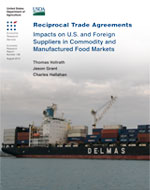Reciprocal Trade Agreements: Impacts on U.S. and Foreign Suppliers in Commodity and Manufactured Food Markets
- by Thomas Vollrath, Jason Grant and Charlie Hallahan
- 8/9/2012
Overview
Reciprocal trade agreements (RTAs), which grant special preferences to members, affect the pattern and volume of bilateral trade in global markets. This study uses the gravity framework and panel data depicting annual trade between 69 countries over 31 years to examine how 11 RTAs have shaped U.S. and other suppliers' exports of commodity and manufactured foods. Empirical results show that joint RTA membership enabled exporters to increase their trade with member country importers in the two food markets. The few agreements that failed to have a positive effect on member trade in either commodity food or manufactured food involve developing countries that typically grant very limited cross-border trade preference to member countries. Interestingly, model results indicate that RTAs can be a vehicle to increase trade externally. Nine of the 11 RTAs also expanded exports externally to nonmember countries, albeit to a lesser degree than with member importers. In some cases, however, nonmember exporters of food bore the cost of the RTA-induced expansion of trade. Five RTAs lowered food imports from nonmember suppliers. The adverse effects on nonmember suppliers were more pronounced for the United States than for other competitors.
Download
-
Entire report
Download PDF -
Report summary
Download PDF

